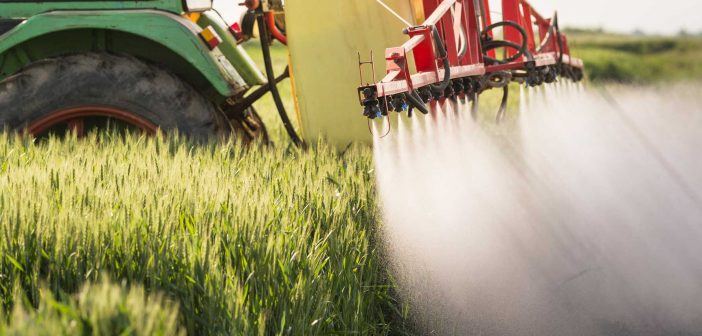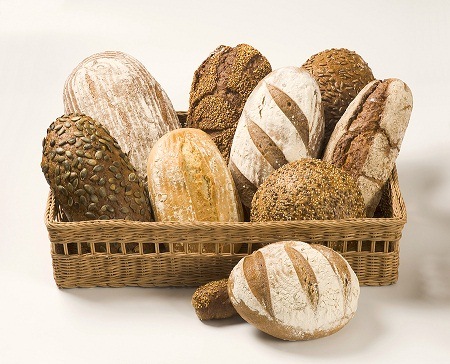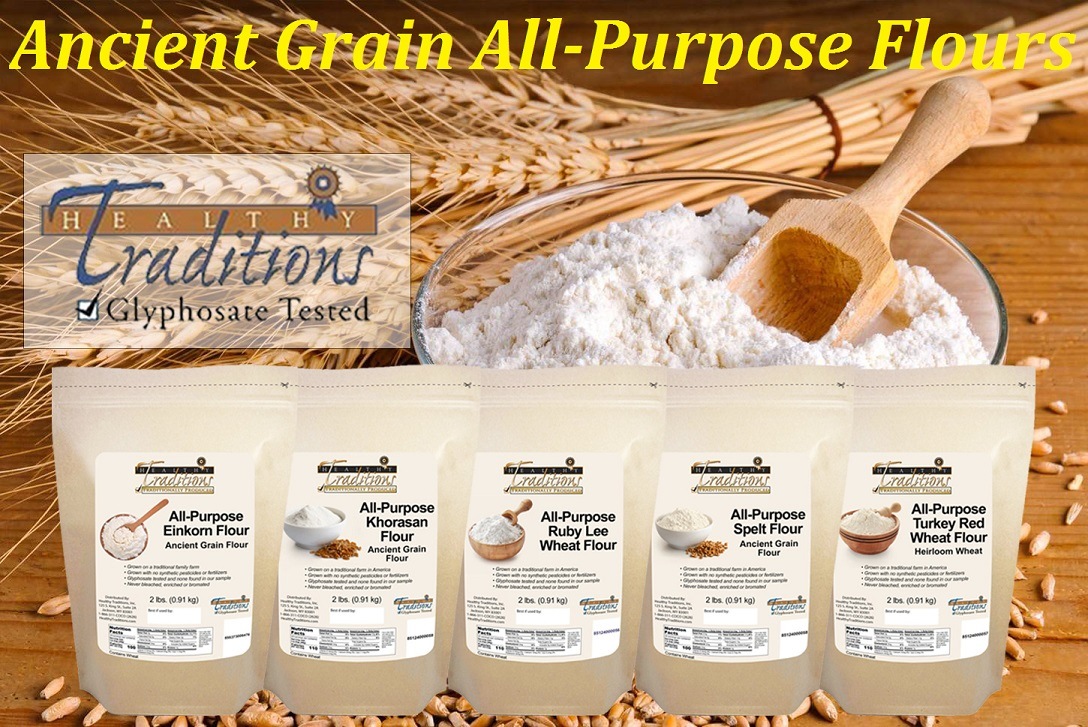by Brian Shilhavy
Healthy Traditions Press Release
Wheat has received a bad rap in modern times, being blamed for the cause of many diseases and illnesses.
Many in the alternative health field show their belief in Darwinian biological evolution bias by claiming that wheat was never a plant that was good for human consumption, stating that human ancestors who evolved over millions of years were “hunters and gatherers”, and never planted crops.
However, even the evidence from archaeology clearly shows that ancient cultures were much more advanced than the evolutionists would have us believe, and were much more than simply “hunters and gatherers.” See:
‘Cavemen’ Diet Was Far from Primitive: Paleo Diet Myths
Excerpt:
Countless schoolchildren have been told that they evolved from cavemen who wore no clothes, communicated in grunts, and were primitive hunters.
But many of their teachers can’t answer the question “how do you know that?”
Tiny remnants of ground-up grains were recently found at Neanderthal dwelling sites, and like so many other recent finds, they contradict a common evolution-based myth about human origins.
Tales of human evolutionary development, even those appearing in accepted textbooks and museums, are large on imagination.
G. K. Chesterton, one of the 20th century’s most insightful authors, pointed out this tendency back in 1925 when “Java Man” stories of human evolution were embellished, much like stories of Lucy or Ardi are today.
Chesterton observed that the evolutionary paleontology professor “produces his little bone, or little collection of bones, and deduces the most marvelous things from it.”
A full picture of the supposed caveman’s life is painted and presented to the world, but where does such a professor obtain these details?
“He found in Java a piece of a skull….But the effect on popular science was to produce a complete and even complex figure, finished down to the last details of hair and habits,” wrote Chesterton.
Decades after that was written, Java Man was finally shown to be a fraudulent combination of fossilized bones from unrelated species that were taken from different locations, vindicating Chesterton’s insight.
In 2009 and 2010, discoveries of advanced communication and construction skills continued to challenge the “primitive” portrayals of early man.
And the recent discovery that ancient humans harvested, prepared, and consumed grains adds to this list. (Source.)
See also:
Are “Hunter Gatherer” Cultures Really “Paleo”?
When we read the historical records of the Bible, the most widely distributed collection of writings from antiquity, we read that man’s first job as entrusted to him by his Creator, was as an agriculturist to cultivate the earth.
And the LORD God planted a garden in Eden, in the east, and there he put the man whom he had formed. And out of the ground the LORD God made to spring up every tree that is pleasant to the sight and good for food.
The LORD God took the man and put him in the garden of Eden to work it and keep it. (Genesis chapter 2)
For most of human history, until just recently in the “age of technology”, grains were considered the “staff of life,” and the most consumed food on the planet.
The word “bread” is used to represent food and life itself, throughout the Bible.
Give us this day our daily bread. (Words of Jesus in Matthew 6:11)
Jesus said to them, “I am the bread of life; whoever comes to me shall not hunger, and whoever believes in me shall never thirst.” (John 6:35)
So how did grains and food made from them become so unhealthy in modern times? Because most people who cut out wheat from their diet today become much healthier, and that is a fact that cannot be denied.
The answer to this mystery lies in how grains are grown in the U.S. today, and then how they are processed after they are harvested and end up in the food chain as processed foods.
Commercial Grains Agriculture

First, most of the modern varieties of wheat today have been hybridized to be able to grow across multiple climates with a higher gluten elasticity for mass production of commercial bread and other wheat products.
These commercial grain operations that can cover thousands of acres also need chemical inputs, such as pesticides and herbicides.
And while there are no genetically modified varieties of wheat that are commercially grown in the U.S., the main herbicide sprayed on GMO crops, glyphosate, ends up in most grains grown in the U.S., particularly in the colder, northern states where most of the nation’s grains are grown: Montana, and North and South Dakota, as well as Canada.
In these states, it is actually a practice of commercial grain operations to spray their grains with glyphosate just prior to harvest, to kill the wheat so it can be harvested at a convenient time before the snow starts to fall.
Most of American wheat and other grains, particularly oats, are contaminated today with glyphosate which causes cancer and is linked to many other diseases and illnesses.
If you search for “glyphosate” on Health Impact News, you will find nearly 400 articles we have written on this subject.
In 2014, my company Tropical Traditions began testing all of our food for the presence of glyphosate, and we were shocked to find out that our USDA certified organic grains were contaminated with glyphosate, even though they were certified “organic.” See:
ALERT: Certified Organic Food Grown in U.S. Found Contaminated with Glyphosate Herbicide
This led us on a search to find grains that were not contaminated with glyphosate, and we began importing most of our grains from Italy, where it was much easier to find grains that tested free of the herbicide glyphosate.
In recent years, we have also identified certain American farmers who have successfully grown grains without glyphosate contamination, among our Amish farmers in Wisconsin, a farm in Washington State, and some southern wheat grown by Mennonites in Oklahoma.
Emphasis on Ancient Grains

In our search for glyphosate-free gains, we placed an emphasis on open-pollinated heirloom ancient grains, as opposed to the modern wheat varieties.
The oldest variety of wheat is Einkorn, which was first cultivated 5,000 to 10,000 years ago in the upper area of the Fertile Crescent of the Near East (Tigris-Euphrates regions), and is quite probably the main grain recorded in the earliest biblical history.
We also now source Khorasan Wheat, an ancient grain that hasn’t been hybridized in modern history and is traced back to the Fertile Crescent, and is thought to be a close relative of durum wheat.
Another ancient grain we now source is Spelt, another ancient wheat that is believed to have begun in the Fertile Crescent several thousand years ago.
We also now source Turkey Red Wheat, an heirloom variety of hard red winter wheat that was very commonly grown in the U.S. until the 1940’s.
It originally came to the U.S. from Mennonite immigrants leaving Ukraine fleeing Tsarist persecution, who brought trunks full of Turkey Red Wheat into Kansas.
We sell these ancient grains in their whole grain form in my Healthy Traditions online store, and they can be stored as whole grains indefinitely.
We encourage people to buy a grain mill and mill these grains into whole grain flours for their own personal use.
Whole grain flours are the most nutritious way of consuming uncontaminated, whole grains. They include all the bran and wheat germ, and are the most nutritious flours one can make.
A reader of Health Impact News who is suffering from COVID-19 vaccine side effects recently emailed me and shared how he is now incorporating whole grains into his diet to help overcome his vaccine injuries.
by Abdula
Earlier this year I started to incorporate whole grain into my diet.
When I first started, I was using hand grain mill. Despite having very low level of energy to the point of having to choose carefully my activities, I enjoyed it. I got some physical activity out of it.
But having to spend half an hour doing physical labor just to grind around a pound of flour was really tiring and that made me not consistent with it.
Fresh whole grain wasn’t my staple; I would have it maybe for a few days and then go back eating “normally”. Which means eating outside. I wasn’t eating fast food on the regular, but still.
Since I wasn’t used to whole grain at this time, it was hard on my digestive system. Eating bread from whole grain flour gave me digestive issues.
My health continued to improve by God’s grace, even with my inconsistency.
I can only make basic bread, but that’s more than enough for me. I now have bread for breakfast, lunch, and dinner. Bread for my main meals, snacks in between, and also dessert (with honey). I also add other whole grain into my bread flour mix and boil millet to and eat it like rice.
The tricky part is to get bread making into my daily schedule. Once I figured that out it was easy.
I know how much bread I need everyday and how often I have to make them. Since now all the work is done by machine it’s much easier. The hand grain mill is still there, just in case I need to use it.
As I started to eat whole grain every meal, my health improvement is very noticeable. I found out now I can eat a lot of it, along with coconut oil and some coconut vinegar. There was a time I ate around 4 cups worth of bread daily.
The oil helps the bread go down and vinegar helps with taste and digestion. It took some getting used to, since I’m using all the energy I have to digest food. But my digestive health is waaayyy better.
My health continued to improve. I really enjoyed the peace of mind that comes with eating healthy. My mind is much more stable and my focus is improving.
It took 2 weeks for my body to get used to eating bread from fresh flour. At that time I had low energy all the time because it felt like all my energy was used for digestion.
Even so, my bowel movement was positively affected. Since then, my energy level is off the roof. I have never felt so energetic all my life. Praise the Lord God who gave me this precious pearl in the form of fresh flour and virgin coconut oil.
I just found out that lack of vitamin B1, aka thiamine causes neurological, digestive, and cardiovascular damage. Reading about it, I’m convinced that I had that deficiency because of my diet. Now I’m in a better shape than ever. For someone like me, the horrors of disease works better to convince me to eat properly.
I started reading about thiamine deficiency, and it seems that thiamine regulates how “efficient” our body generate energy. This energy is used for everything of course, from staying alive to carrying out daily functions.
It’s been barely 2 months since I started eating whole grain daily. My health has tremendously improved.
• Much more energy. I can live normally on a daily basis. A good night’s sleep really helps restoring my energy.
• More focus. I can read better now.
• Able to tolerate coffee – else drinking coffee makes me feel like a kid overdosed on candy.
• Better sleep. No more night sweat that leaves me tired in the morning. I don’t get the fear and heart palpitations when going to bed any longer.
• My mind is calmer.
• Markedly reduced sudden sweating. After the shots even a little exertion whether physical or mental causes me to get drenched in sweat.
• My body doesn’t feel really hot or extremely cold.
• No more sudden panic attacks that seem to come out of nowhere.
• I can breath better now. I used to feel “choked” especially when stressed. Now it feels like the airway has opened wider. Peppermint oil seems to help with my breathing.
• Better digestion. Daily bowel movement without needing to strain.
• My leg nerve pain is better now. This is in conjunction with peppermint oil.
• I don’t feel like I’m constantly on a rush when I’m doing anything.In a way my food intake is very restricted. Bread is my main source of carbohydrate and add some fat and protein and I’m good to go. This restriction also makes things easy. I don’t need to eat outside and my meal planning is straight forward: make bread and that covers most of it.
I am thankful to God for healing me, physically and spiritually. He chose me to be among His people, a member of his household and blesses me generously. I could have died from the shots or continued living in my sin (which is the same) but He has other plans for me. –Abdula
Introducing Healthy Traditions Ancient Grain All-Purpose Flours
All-purpose flours are flours that have sifted out much of the bran from the whole grains. They can be referred to as “sifted flour”, “white flour”, or “all-purpose” flours.
They do increase your carbohydrate intake, and are not real suitable for those following a strict ketogenic diet.
In ancient times, these sifted flours were much more laborious to make, and were used in fine foods served to Kings.
Solomon’s provision for one day was thirty cors of fine flour…. (1 Kings 4:22)
And while whole grains are more nutritious, it can be very difficult for those who are used to processed flours to make the instant transition to whole grain flours, as Abdula mentioned above.
Today’s commercially mass-produced all-purpose white flours are full of chemicals such as bromate and other preservatives.
There really is nothing healthy about them at all. They are certainly no longer fit for the table of Kings.
At Healthy Traditions, we decided to mill our own all-purpose flours from our ancient grains that are tested for glyphosate.
We believe that these are a much healthier option, and they can help make the transition to whole grain flours, by mixing in small amounts of whole grain flours with our milled all-purpose flours, increasing the amount of whole grain flours in your flour mix until your body can handle 100% whole grain flours.
We had to purchase and learn how to use our own roller mill to make these all-purpose flours, because asking a commercial mill to mill them for us would open them up to contamination from other grains that they mill.
So today we are introducing to the public own new Ancient Grain All-Purpose flours!
They are available in 2 lbs., 5 lbs., and 25 lbs. packaging.
Since these all-purpose glyphosate-tested ancient grain flours are new to the public, we are offering the 2 lb. size at a significant discount right now, at 70% OFF the retail price (limit 1 per order).
They include: All-Purpose Einkorn Flour, All-Purpose Khorasan Flour, All-Purpose Ruby Lee Four, All-Purpose Spelt Flour, and All-Purpose Turkey Red Wheat flour. (Click on the links to get the 70% discount. This sale will end in a couple of days from publication of this article.)
All of these flours will react and taste slightly different in your recipes, so we encourage you to purchase the 2 lb. size of each during this sale to experiment with them.
Also, since we are trying to re-educate America on how grains can be healthy again, we are taking recipe submissions with these new Ancient Grains on the Healthy Traditions recipe site, where you could earn a $50 Gift Certificate for the Healthy Traditions store if we publish your recipe. (Submit your recipe and photo here.)
For me personally, today marks the culmination of a 10-year journey, starting the day we tested our “organic” flours in 2014 that tested positive for glyphosate, to the sourcing of clean, ancient grains over the years, and now, all-purpose flours that are clean, and genetically purer as heirloom, ancient grains, than anything else you will probably find on the market.
Let’s reclaim grains as HEALTHY again!
For I received from the Lord what I also delivered to you, that the Lord Jesus on the night when he was betrayed took bread, and when he had given thanks, he broke it, and said, “This is my body, which is for you. Do this in remembrance of me.” (1 Corinthians 11:23-24)
Disclaimer: I am both the founder and President of Healthy Traditions, and the Editor of Health Impact News. I don’t make any money from my writing, but I do earn my living from the Healthy Traditions online store.
Comment on this article at HealthImpactNews.com.




